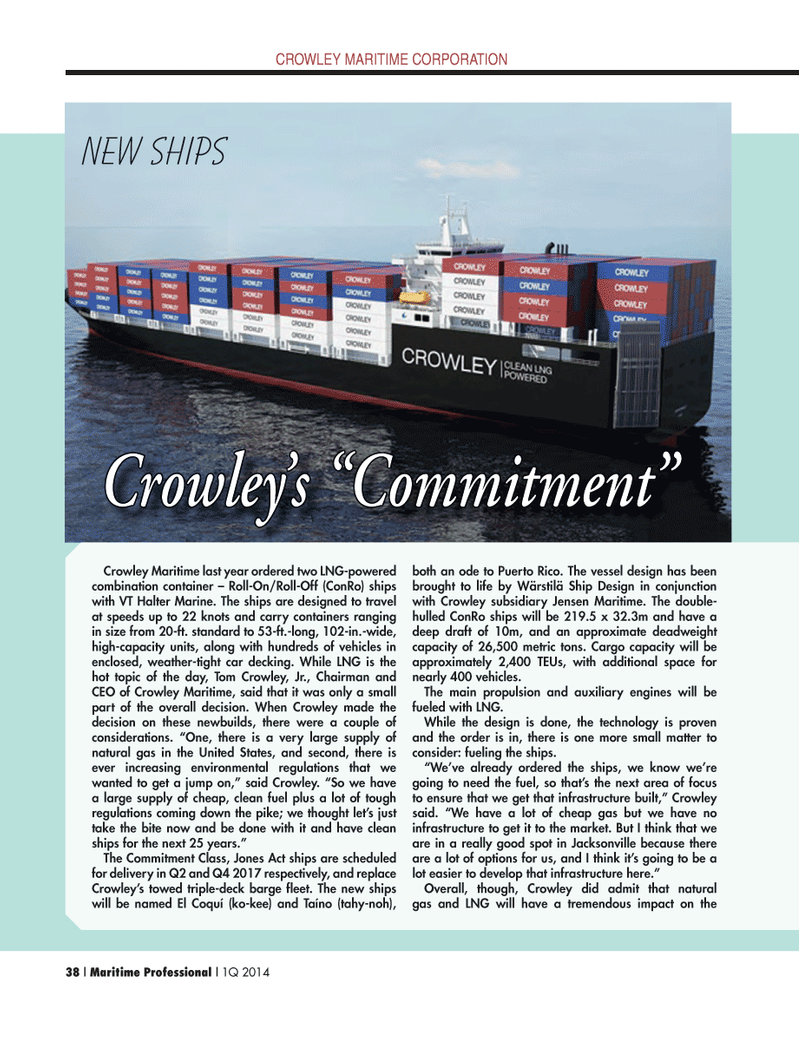
Page 38: of Maritime Logistics Professional Magazine (Q1 2014)
The Energy Edition: Exploration, Production & Transportation
Read this page in Pdf, Flash or Html5 edition of Q1 2014 Maritime Logistics Professional Magazine
CROWLEY MARITIME CORPORATION
Crowley Maritime last year ordered two LNG-powered combination container – Roll-On/Roll-Off (ConRo) ships with VT Halter Marine. The ships are designed to travel at speeds up to 22 knots and carry containers ranging in size from 20-ft. standard to 53-ft.-long, 102-in.-wide, high-capacity units, along with hundreds of vehicles in enclosed, weather-tight car decking. While LNG is the hot topic of the day, Tom Crowley, Jr., Chairman and
CEO of Crowley Maritime, said that it was only a small part of the overall decision. When Crowley made the decision on these newbuilds, there were a couple of considerations. “One, there is a very large supply of natural gas in the United States, and second, there is ever increasing environmental regulations that we wanted to get a jump on,” said Crowley. “So we have a large supply of cheap, clean fuel plus a lot of tough regulations coming down the pike; we thought let’s just take the bite now and be done with it and have clean ships for the next 25 years.”
The Commitment Class, Jones Act ships are scheduled for delivery in Q2 and Q4 2017 respectively, and replace
Crowley’s towed triple-deck barge fl eet. The new ships will be named El Coquí (ko-kee) and Taíno (tahy-noh), both an ode to Puerto Rico. The vessel design has been brought to life by Wärstilä Ship Design in conjunction with Crowley subsidiary Jensen Maritime. The double- hulled ConRo ships will be 219.5 x 32.3m and have a deep draft of 10m, and an approximate deadweight capacity of 26,500 metric tons. Cargo capacity will be approximately 2,400 TEUs, with additional space for nearly 400 vehicles.
The main propulsion and auxiliary engines will be fueled with LNG.
While the design is done, the technology is proven and the order is in, there is one more small matter to consider: fueling the ships. “We’ve already ordered the ships, we know we’re going to need the fuel, so that’s the next area of focus to ensure that we get that infrastructure built,” Crowley said. “We have a lot of cheap gas but we have no infrastructure to get it to the market. But I think that we are in a really good spot in Jacksonville because there are a lot of options for us, and I think it’s going to be a lot easier to develop that infrastructure here.”
Overall, though, Crowley did admit that natural gas and LNG will have a tremendous impact on the
New Ships
Crowley’s “Commitment”wle s “Commitment 38 | Maritime Professional | 1Q 2014
MP Q1 2014 34-49.indd 38 2/26/2014 1:29:12 PM

 37
37

 39
39
